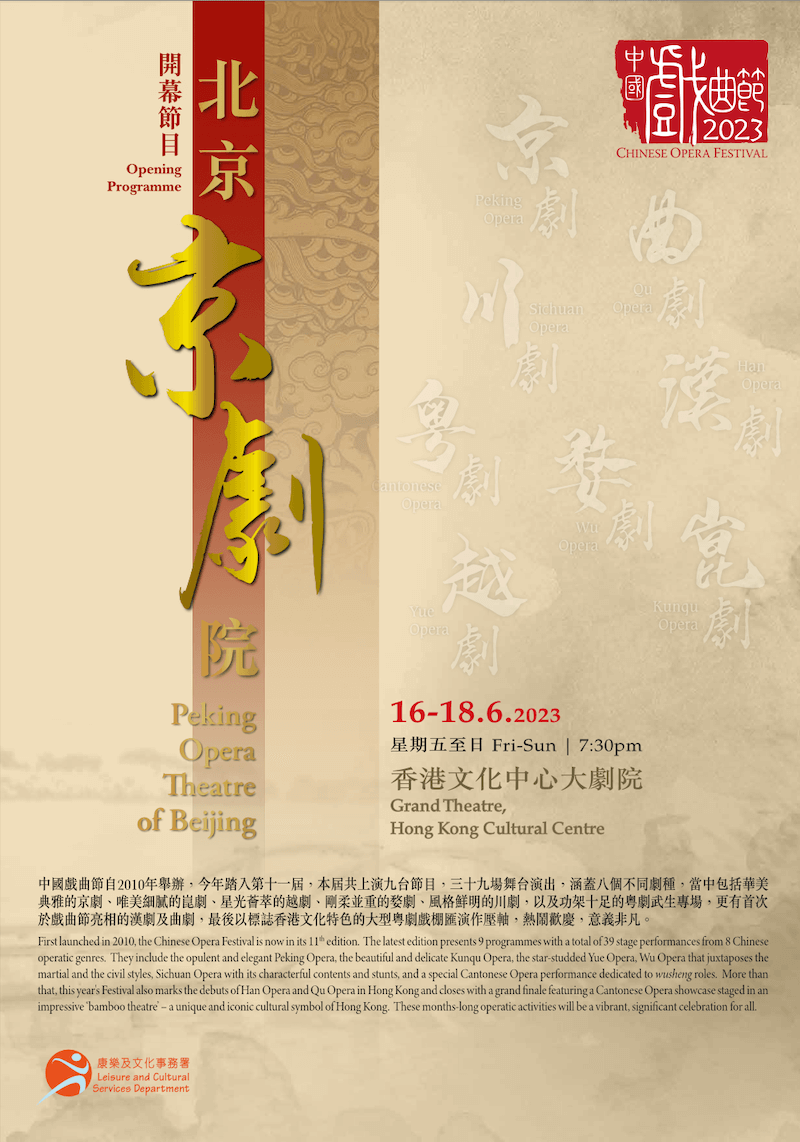Ticketing

16-18/6 (Fri-Sun) 7:30pm

Grand Theatre, Hong Kong Cultural Centre
With Chinese and English surtitles.
Audience is strongly advised to arrive punctually.
Latecomers will only be admitted at a suitable break.Please refer to the 'Extension Activities' page for details of extension activities.
Enquiries: 2268 7325 (Programme) / 3166 1100 (Ticketing)
Booking: 3166 1288 / www.urbtix.hk
(Tickets available from 12 May at all URBTIX outlets and the Xiqu Centre Ticket Office.)

Ticketing
$480
$380
$280
$180
Opening Programme — Peking Opera Theatre of Beijing
The opening programme of the Chinese Opera Festival consists of three performances highlighting the artistic legacy of Peking Opera master Zhang Junqiu, famed for his qingyi (virtuous female) roles and lauded as one of the best performers of dan (female) roles. More than half a century ago, the playwright of Han Opera Chen Bohua presented Zhang with the script of Top Scholar as Matchmaker along with a phoenix coronet, introducing what would become an iconic piece in the repertory of Peking Opera – and a work forever identified with Zhang Junqiu. Top Scholar as Matchmaker stars his disciple Wang Rongrong – a winner of the China Theatre Plum Blossom Award formerly helming the First Troupe of the Peking Opera Theatre of Beijing – in her mentor´s role of Princess Chai. The second performance features Battling Ma Chao and a lighthearted romantic comedy made famous by Zhang, Poetry Contest. The finale of this series features Wang Rongrong as White Snake – one of the celebrated roles that established Zhang´s early fame – in Jinshan Temple, The Broken Bridge and Leifeng Pagoda, which demands lyrical and martial skills encompassing Peking Opera and Kunqu Opera styles, culminating in Zhang´s celebrated and distinctive vocal delivery.
16/6 7:30pm
Top Scholar as Matchmaker
Main Cast: Wang Rongrong, Qiu Shi, Liu Mingzhe, Yu Xinze, Zhou Enxu, Han Juming, Fang Xu
17/6 7:30pm
Battling Ma Chao
Main Cast: Wei Xuelei, Yu Shuai
Poetry Contest
Main Cast: Wang Rongrong, Liu Mingzhe, Sun Zhen, Yu Xinze, Bao Yan, Wang Chao, Lu Jie
18/6 7:30pm
Offering a Humble Apology from The General Reconciles with the Prime Minister
Main Cast: Fang Xu, Qiu Shi
Jinshan Temple, The Broken Bridge, Leifeng Pagoda
Main Cast: Wang Rongrong (Latter Part) / Lu Jie (Former Part), Liu Mingzhe, Wang Chunyan, Sun Zhen, Yu Xinze, Wang Chao, Bao Yan, Wei Xuelei, Han Juming
16.6.2023 (Fri) 7:30pm
Top Scholar as Matchmaker
In 1960, Top Scholar as Matchmaker premiered at the Peking Opera Theatre of Beijing. Celebrated as one of Zhang Junqiu’s iconic works, its lively and amusing plot is imbued with humour and distinguished by an original and much-loved vocal style bearing Zhang’s imprimatur. An erhuang yuanban passage that Princess Chai sings in the palace (‘Since the day I met Liulang on the battlefield’) is now standard repertoire in Peking Opera. In 1963, Zhang Junqiu travelled to Hong Kong with the Peking Opera Company of Beijing (predecessor of the Peking Opera Theatre of Beijing) and his live recording of this celebrated work still exists. His disciple Wang Rongrong has performed this work almost 2,000 times, even appearing in the film version.
Adapted by Ye Delin from the Han Opera The Invincible Formation and now an iconic repertory work of the Zhang (Junqiu) School, Top Scholar as Matchmaker received its premiere in 1960 at the Chang’an Theatre in the Chinese capital, performed by the Peking Opera Theatre of Beijing.
On a hunting trip in the border area, Song Emperor Zhao Guangyi and Princess Chai Meichun are ambushed by an enemy general from the Kingdom of Liao. Yang Yanzhao (of the legendary family of Yang generals), en route from Tongtai, frees the captives. Fu Dingkui, son of senior court official Fu Long, also rushes to the scene. Mistaking that they have been saved by Fu, the Song Emperor promises the Princess to Fu Dingkui as bride. However, the Princess has fallen in love with the handsome Yang, giving him a vestment made of precious pearls. Trouble ensues, but misunderstandings are rectified thanks to the Eighth Prince and the newly appointed Top Scholar Lu Mengzheng. In the end, Yang Yanzhao marries the Princess.
Main Cast: Wang Rongrong, Qiu Shi, Liu Mingzhe, Yu Xinze, Zhou Enxu, Han Juming, Fang Xu
17.6.2023 (Sat) 7:30pm
Battling Ma Chao
Battling Ma Chao is also known as Two Generals, an iconic work in the classic Peking Opera repertory. The physical battle is filled with athletic movements and balancing poses—rapid turns, single-leg stands, kick and strides and elaborate entrance sequences—testing performers’ strength and flexibility. The battle scene also pits the wusheng (military male role) against the equally demanding wujing (military painted-face role), a visual feast to delight the theatregoer.
During the Three Kingdoms period, a defeated Ma Chao takes refuge with Zhang Lu, who sends him to attack Jiameng Pass in order to restrain Liu Bei and rescue Liu Zhang. Zhuge Liang goads Zhang Fei into defending the Pass. Ma Chao and Zhang Fei, evenly matched, battle from day to night without a clear winner. Impressed by Ma’s valour, Liu Bei enters the fray. Ma is deeply moved and decides to join Liu’s forces.
Main Cast: Wei Xuelei, Yu Shuai
Poetry Contest
A representative work of Zhang Junqiu, Poetry Contest was adapted by Shen Fengxi in 1960 from the play Green Peony by Ming dynasty dramatist Wu Bing. This tale, widely praised as one of the Top Ten Chinese Classic Comedies, has many amusing twists and turns, with an elegant and enchanting Peking opera vocal style that has won many fans. Che Jingfang’s siping diao passage ('Happily I enter into the gallery') is a well-known tune far and wide.
Shen Zhong hosts a poetry contest in the hopes of finding a worthy son-in-law. While Gu Ziyu is outstanding, the other two prospects come with help—Che Buqing enlists his sister Jingfang and Niu Siwen asks Xie Ying, a scholar from his household, to compose on his behalf. Shen cannot choose among the candidates, so he sets a new contest: whoever wins the title of Top Scholar can wed his daughter. Niu is smitten by Che Jingfang, so he asks her brother to make a match. Jingfang wants to test her suitor’s poetic prowess, so Niu brings along Xie. The latter is so impressed by Jingfang’s intellect and beauty he cannot bring himself to deceive her, so he just composes bad poetry. On the day the Top Scholar is announced, both Che and Niu pretend to have won the title and make their way to the Shen mansion. But Gu, the real Top Scholar, and Xie uncover the hoax. Not only does Shen accept Gu as son-in-law, but the older gentleman also proposes marriage between Xie Ying and Che Jingfang. Jingfang has lingering doubts about Xie, who reveals his true poetic talent, and the two are betrothed.
Main Cast: Wang Rongrong, Liu Mingzhe, Sun Zhen, Yu Xinze, Bao Yan, Wang Chao, Lu Jie
18.6.2023 (Sun) 7:30pm
Offering a Humble Apology from The General Reconciles with the Prime Minister
Offering a Humble Apology is a classic Peking Opera pas de deux featuring two established role-types: laosheng (old male) (as Lin Xiangru) and hualian (painted face) (as Lian Po). Multiple renowned artists in these role-types have played opposite each other, establishing different schools of interpretation popular among Peking Opera fans and enduring the test of time.
The plot is based on biographical entries on Lian Po and Lin Xiangru from Sima Qian’s Records of the Grand Historian and Chronicles of the Eastern Zhou Kingdoms. After scoring a string of successes in protecting and advancing the State of Zhao, Lin Xiangru is promoted as prime minister. General Lian Po, a conceited rival in court, is jealous and goes out of his way to insult Lin, but Lin consistently deflects these head-on conflicts. Later, Li Xian appeals to Lian, explaining that Lin Xiangru deliberately sidesteps such confrontations in order to preserve the kingdom’s peace and well-being against the threat of neighbouring Qin. Moved by Lin’s high morals, Lian bears a cane on his back to make amends. The two then become great allies.
Main Cast: Fang Xu, Qiu Shi
Jinshan Temple, The Broken Bridge, Leifeng Pagoda
As core repertory in Peking Opera, these three iconic scenes performed by Zhang Junqiu early in his career. Wang Rongrong, currently the leading exponent in the Zhang style, is also praised for her mastery performing such scenes. For example, the vocal dexterity and emotional range requisite in the 18-minute fanerhuang manban passage in 'Ritual at the Temple', where Bai Suzhen recounts her past ('Before speaking, tears flow from my eyes'), bears the hallmarks of Zhang's artistry.
After Bai Suzhen stole the magic herb to revivify her husband Xu Xian, Xu goes to the Jinshan Temple to pay tribute to the deities. When he doesn't return for a few days, Bai and her sister Xiao Qing travel to the temple, asking Abbott Fahai for Xu. The Abbott refuses her request. Bai summons sea goblins to flood the temple, and Fahai calls the celestial army in defense. Pregnant and thus feeble, Bai loses the battle. When she retreats to the Broken Bridge, Xu Xian rushes over by her side. Xiao Qing is angry that Xu Xian has forsaken his love and wants to kill him, but Bai intercedes. The three make peace. Later, Bai gives birth to her son Shilin. When the baby is barely a month old, Fahai traps Bai in a golden bowl and holds her captive under Leifeng Pagoda. Years later, Shilin becomes the Top Scholar and arrives at the pagoda to perform filial rites for his mother. Bai appears before her son. In tears, she retells the sad story of her life. Finally, mother and son painfully take leave of each other.
Main Cast: Wang Rongrong (Latter Part) / Lu Jie (Former Part), Liu Mingzhe, Wang Chunyan, Sun Zhen, Yu Xinze, Wang Chao, Bao Yan, Wei Xuelei, Han Juming
The running time of each performance is approximately 2 hours and 30 minutes including an intermission of 15 minutes.
Information provided by the arts groups
Peking Opera Theatre of Beijing
Founded in 1979 by merging two companies based in China’s capital, the Peking Opera Theatre of Beijing was the home of the legendary “four great performers in dan roles”—Mei Lanfang, Shang Xiaoyun, Cheng Yanqiu and Xun Huisheng—and other masters such as Ma Lianlang, Tan Fuying, Zhang Junqiu, Qiu Shengrong and Zhao Yanxia. Among the Theatre’s other distinguished artists who shaped the history of the artform are Wu Suqiu, Li Wanchun, Li Duokui and Zhao Rongchen. The company currently boasts a contingent of influential actors, including National Class One artists Wang Rongrong, Du Zhenjie, Li Hongtu, Chi Xiaoqiu, Zhu Qiang, Zhang Huifang and Hu Wenge. The Peking Opera Theatre of Beijing's roster of performers covers all character roles and specialties from different styles and schools, with a rich collection of repertory. Renowned for presenting traditional classics, it also develops new works. In the past few decades, the company has presented several hundred productions, receiving many national accolades, and has been invited to perform in many countries and regions, gaining much international acclaim.








